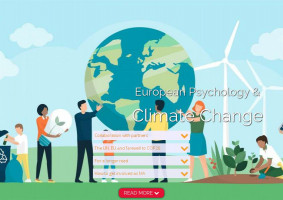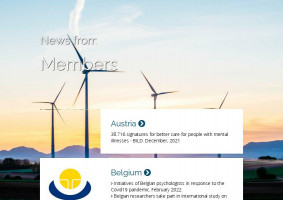READ MORE
Global Psychology Alliance: “Psychology in Action:
Leading for the Climate”
Following COP26, the GPA hosted a virtual conference that specifically focused on psychology and the climate crisis. The “Psychology in Action” conference took place almost two years to the day after the inaugural “International Summit on Psychology’s Contributions to Global Health” which was held in Lisbon, Portugal.
The programme of talks is available here.
You can watch selected talks by registering at this link
• Session 1: https://youtu.be/P3ue3pN4OLw
• Session 2: https://youtu.be/ancfHA-_xh8
Order of Psychologists Piedmont: “Psychological Voices for the Planet’s Future: Surrounding Ourselves with Well-Being”
Our friends in the Order of Psychologists Piedmont Italy hosted this climate event on Friday 22 October in 2021. Given Italy were co-hosts with the United Kingdom of COP26, this psychology event was timely. Conference chair Georgia Zara has written this piece explaining why the Piedmont Order thought the event was important to hold, and how psychology can contribute on climate change. EFPA’s position on psychology’s contribution to the problem of climate change was presented at the event by Vice President Nicola Gale.
BACK TO TOP
This is our farewell to COP26, the 2021 United Nations (UN) climate change conference, in our Newsmagazine although we sincerely hope the agreements reached by the parties are lasting ones for the good of our planet.
European Psychologists attend COP26
European psychology attended parts of COP26 as members of the Global Psychology Alliance (GPA). This was through the American Psychological Association, which was accepted as an UN Observer Organisation to attend COP26. This was a significant opportunity. Nicola Gale, EFPA Vice President, summarised her thoughts on attending COP26 in these words, first presented at the “Psychology in Action: Leading for the Climate” GPA conference held post COP26.
1-2 highlights/take-aways from COP26
A big thing that struck me is the unifying power of the climate emergency, in bringing people together. This was evident at COP26 from the sheer number of delegates, the energy in protests, the range of organisations present, the high quality exhibitions, and the huge media interest. In the sessions government ministers, third sector, and business were all engaged, obviously with some different motives but by and large united in doing something.
The power of communities at different levels to try for change was evident, as was how easily some more marginalised voices can go unheard. In particular, hunger from young people for education and change was on display, in protests, as speakers, and in an exhibition of children’s touching letters. A very short and to the point letter displayed on a wall from a 9 year old to their teacher said simply ‘please can you make a lesson about climate change’.
Another key reflection was on what is joined up and what is separate. The big issues of decarbonisation and food / forestry and nature are only just being brought together. The technocratic solutions tend to remain separated from the human process. For a plenary I attended, though, this was different. This session was on an Indonesia / UK initiative called FACT, for Forest, Agriculture and Commodity Trade. Here there was real evidence that the skills opportunities and needs of peoples were being seen as a primary focus of intervention. This was about protecting and restoring the forests, and reforming the food and farming system, but doing so by taking into consideration the needs of smallholders and indigenous peoples as the guardians of the land.
1-2 ways in which those highlights inform the path forward for global psychology
There’s a lot of potential for psychology working at the community level to engage peoples for change. This means a role for the GPA and national, regional, international psychology bodies in bringing together community psychologists. Psychologists can draw on shared narratives of how to do this in different cultures and circumstances.
There’s a role too for psychology in bringing attention to the human factors, using the knowledge base to support behaviour change. This needs to include the systemic level of social infrastructure and not just point at individual level changes. In other words, what governments, public bodies, organisations need to put in place. Supportive of people interventions matter but it is interventions supporting change that will help solve the climate problem.
The report of the APA titled 'Advocating for psychological science at COP26' can be found here .
In it APA’s Senior Director for International Affairs Amanda Clinton, who coordinated the delegation to COP26, explains the aim to increase awareness of psychology’s contributions to addressing the climate crisis and discuss the role of psychological science.
You can watch the Global Psychology Alliance observers’ reflections on attending COP26 here
Amanda Clinton, Nicola Gale, Terri Morrissey, Tiago Pereira, Richard Plenty, Sofia Ramalho.
The Glasgow Climate Pact
sets out the commitments across the globe on:
- Mitigation - reducing emissions
- Adaptation - helping those already impacted by climate change
- Finance - enabling countries to deliver on their climate goals
- Collaboration - working together to deliver even greater action
COP26 Outcomes available here ( in French, Spanish and Russian)
The final statement from the UK presidency
which concluded: “Today, we can say with credibility that we have kept 1.5 degrees within reach. But, its pulse is weak. And it will only survive if we keep our promises. If we translate commitments into rapid action. If we deliver on the expectations set out in this Glasgow Climate Pact to increase ambition to 2030 and beyond. And if we close the vast gap that remains, as we must.”
The UK Government’s document COP26:
The Negotiations Explained which sets out the issues and key agreements from the Conference.
You can also ‘watch again’ on the UNFCCC website or the COP26 YouTube channel
-
The EU had this to say:
The EU had this to say: The EU in a statement from Mauro Petriccione Director-General for Climate Action, European Commission reflected on COP26 as “an important step in the right direction, in some areas even a breakthrough, opening precious opportunities for progress in the fight to stop climate change”
The importance of following through on commitments in Europe was emphasised, in terms of the European Green Deal.
Fold out text
On 17 November, the Commission adopted three new initiatives for making the European Green Deal a reality. The Commission is proposing new rules to curb EU-driven deforestation, as well as new rules to facilitate intra-EU waste shipments to promote circular economy and tackle the export of illegal waste and waste challenges to third countries. The Commission also presented a new Soil strategy to have all European soils restored, resilient, and adequately protected by 2050. With these proposals, the Commission is presenting the tools to move to a circular economy, protect nature, and raise environmental standards in the European Union and in the world.
You can watch any of the 160 EU side events from COP26 on their platform by registering here
BACK TO TOP
APA report : “Mental Health and Our Changing Climate”
As part of their contribution to COP26, APA jointly issued a report on November 4 with ecoAmerica entitled, "Mental Health and Our Changing Climate," authored by Susan Clayton, PhD, Whitmore-Williams professor of psychology, College of Wooster; Christie Manning, PhD, director of sustainability and assistant professor of environmental studies, Macalester College; Meighen Speiser, executive director, ecoAmerica; and Nicole Hill, ecoAmerica.
The report provides the latest information on the multiple effects of climate change on mental health, the structural inequities that lead to some populations bearing greater impacts, and how people think about and respond to climate change. It goes on to describe how individuals and communities can strengthen their resilience in the face of climate change and work for climate policies that will lead to a healthier and more just society.
‘The Green Planet’ from the BBC, was premiered at COP26 in the Glasgow Science Centre, the official venue for the COP26 Green Zone. It’s available on iPlayer and may brighten your winter evenings
Climate change: 10 things that Educational Psychology (EP) services could do to reduce their carbon footprint
By Daniel OHare
Originally published on BPS blog, November 16, 2021.
It's the end of COP26 and it seems that the language within draft agreements has been watered down leading to disbelief and anger for many. I speak for myself here too. Over the past few weeks I have been reflecting on the changes that EPs and EP services could actually make, to reduce the carbon footprint of the entire profession. This conversation is important because EPs might be considered 'high carbon' professionals. It's a job that invariably and frequently relies on transport via private car. Not only do EPs need to use their cars to commute, but there is also often the need to travel between schools, offices and meeting places within the same day. I hope some of these ideas spark conversation, discussion and debate, and I would love to hear what aspiring, trainee, main-grade and Senior/Principal EPs think.
BACK TO TOP
EFPA’s News Magazine will be carrying regular stories about climate change over the next few editions. If you have a story and want to share the work of your association, please contact our editor via News@efpa.eu.
_w1700_h444_1.png)















